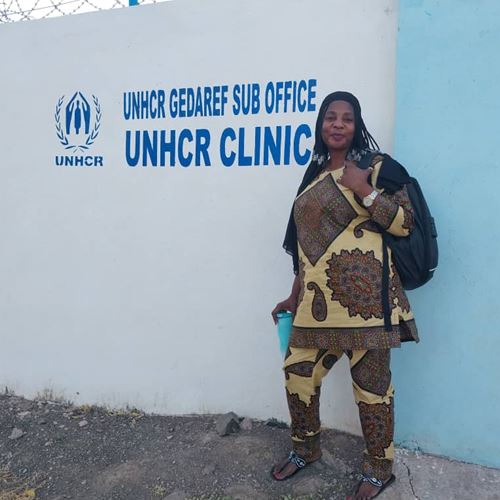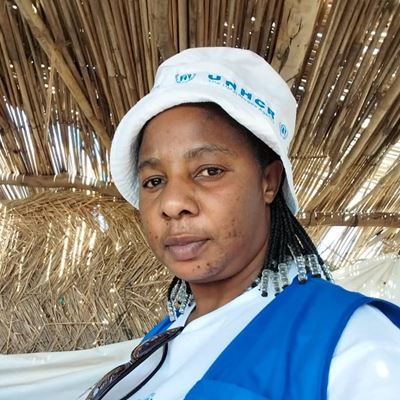News
Stories from the field: Interview with Associate Registration and Identity Management Specialist, deployed to Sudan
Our DRC Standby Roster intern, Silvia, had the opportunity to interview Tendai Dopo, a member of the Registration Roster, on 16 December 2022.

Tendai Dopo joined the Registration Roster in March 2020. She is a Zambian national and for over 15 years, she has worked with UNHCR Zambia. She is currently deployed with DRC to El Gedaref, Sudan, as an Associate Registration and Identity Management Specialist. Among other tasks, she monitors compliance with the Standard Operation Procedures (SOPs) for Registration and Identity Management, trains national registration staff, conducts data clean-ups, and generates monthly statistics and narrative reports. In addition, she shares distribution manifests for all food and non-food items with partners who requested them for their records and reconciliations.
Silvia: What are your everyday tasks, can you tell me about a typical day?
Tendai: My daily activities are usually data related. Since all UNHCR’s assistance work is undertaken through the platform PRIMES, which includes tools such as proGresV4 - the main database for refugee information- and the Global Distribution Tool, it is highly important that we collect the relevant data and register it. The distributions or assistance activities are conducted by UNHCR in coordination with the World Food Program (WFP) for food distributions, NGOs, such as DRC, NRC, or national partners for nonfood items such as charcoal, core relief items, education materials, etc. These activities are carried out in the two refugee camps, the two reception centers, and one refugee settlement that are in the region. Our partners send us a list of the people needing assistance and we verify if they are registered. We also clean up the database accordingly.
In addition to this data-related work, I also contribute to enhancing the capacity of UNHCR staff. I supervise and train protection staff on how to use these data tools. In my unit, we are three who have a supervisory role, whereas 18 national staff go to the field daily, to conduct registration activities in coordination with staff from the Commissioner for Refugees (COR Sudan).
Finally, I am also the unit’s focal person for reporting daily on new arrivals. Every day at 5:00 PM, both on weekdays and on weekends, national colleagues contact the authorities at the border and the reception centers to find out the number of new arrivals and inform me. Then I compile the statistics and report to our senior management.
Silvia: Considering the volatility of the situation in the region, have you noticed some changes in the populations that are seeking asylum in your duty station’s region?
Tendai: Within my area of responsibility, all the people of concern are Ethiopians. I must say that, since the start of the Peace Talks in Pretoria [between Ethiopia’s government and Tigray authorities], the number of new arrivals has significantly dropped. Before the talks, we could have from 1 to 50 new arrivals every day. Now, we sometimes have 4 to 5 days without any newcomers.
Silvia: What is unique about your duty station El Gedaref? What makes it different from Khartoum or the Darfur region?
Tendai: At the yearly Registration Managers meeting, I had the opportunity to learn about the work outcome of other operations and what are the priorities for 2023. I was impressed to see our operation is doing very well in terms of issuing ID cards and using the data PRIMES tools. In fact, we seem to be the only operation using all of them: the Global Distribution Tool (GDT), proGresV4, CashAssist, etc. It’s quite a unique office.
Silvia: It is your first professional experience outside your home country, Zambia. How is it to work in a new environment, far away from home?
Tendai: The first month here was quite difficult. The culture, the language, the weather, everything was so new to me. However, my supervisor, who is an amazing person helped me a lot. He is very flexible, I can reach out to him at any time and he's always available to offer guidance. Therefore, having a good supportive system helps you to settle quickly and, right now, I'm truly enjoying my experience.
I'll admit, the first time I left my duty station to go on R&R, I was so relieved. Now, that I am going on my second R&R and annual leave the day after tomorrow, I feel that I am going to miss this place [laughs].
Silvia: What tools do you use to take care of your mental health? Do you have any resources that you use to manage stress?
Tendai: One of the things that helps me with mental wellbeing is making sure that I divide my time properly. If you are not careful, you can easily get carried away with work and forget yourself, especially in this kind of duty station where it’s difficult to find social places. So, you mostly do home-office-home. Even when you are home, you are tempted to open your laptop and answer your emails or work. Therefore, I believe that it is very important to stick to working only during office hours.
To keep me busy in my free time, I started a little garden on my balcony. Since it is difficult to find vegetables in the markets here, I planted some seeds that I brought from home. I also do some dancing, and I go for walks with friends. In the weekends, we also spend time playing cards or Scrabble, watching movies, and going to the local market.
Silvia: As a woman, do you feel safe to go for walks in your duty station?
Tendai: It’s safer to walk with a male colleague. Once, a female friend and I tried to walk alone to the market, which is quite close, but it did not go well. My friend only had a hat covering her hair, but it wasn’t enough. So, I would say, it is better to always be accompanied by a man.
Silvia: Have you faced any challenges in your supervisor role?
Tendai: It's easier for our male supervisors to manage their colleagues. Being a female supervisor can be challenging. When I arrived here, I did not know the culture and how to behave with male colleagues. Back at home in Zambia, it is normal to shake hands with men, even hug them, but here you can’t do it. Therefore, I had to learn Sudanese culture habits and gain the respect of my male colleagues. To do that, I decided to make them my friends, and not to act only as their supervisor. Now at the office, everybody's my friend and it’s very easy to work together as a team.

